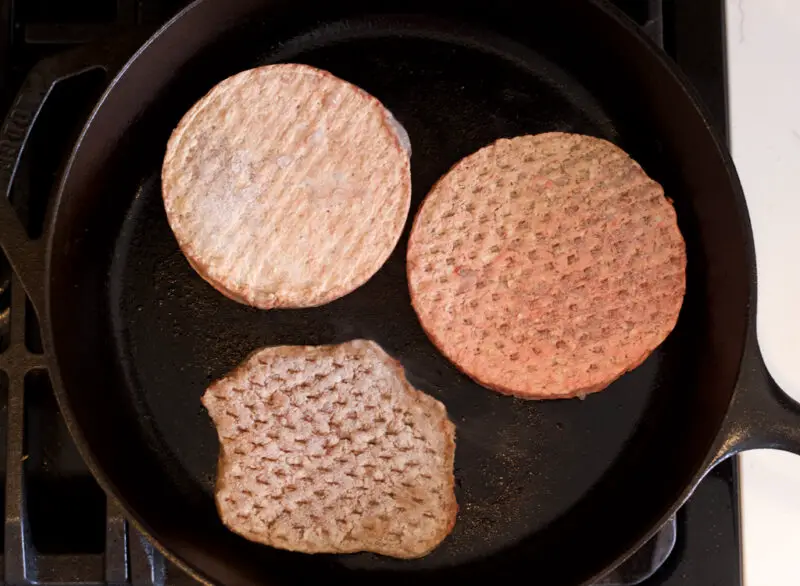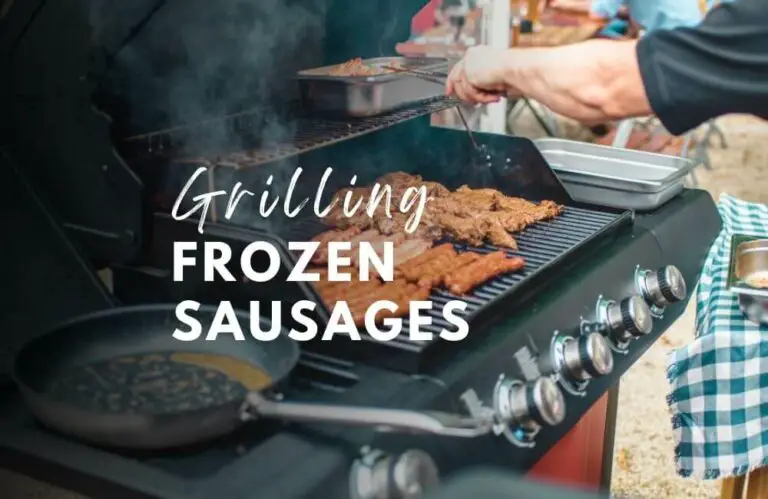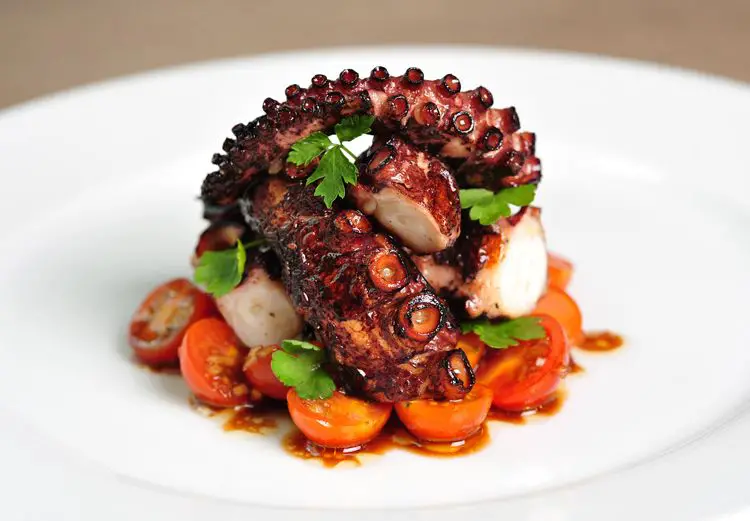Frying is a popular cooking method, and many people wonder if it is safe to fry in an aluminum pan. According to experts, it is generally safe to fry in an aluminum pan as long as certain precautions are taken. Aluminum pans are lightweight and conduct heat well, making them a popular choice for frying. However, there are some potential health risks associated with cooking with aluminum, such as the leaching of aluminum into the food. It is important to use aluminum pans properly and to avoid cooking acidic or salty foods in them for extended periods. Despite these concerns, cooking in aluminum pans also has its benefits, such as even heat distribution and easy cleanup.
Key Takeaways:
- Frying in aluminum pans is generally safe when proper precautions are taken.
- Aluminum pans are lightweight and conduct heat well, making them popular for frying.
- Cooking acidic or salty foods in aluminum pans for extended periods should be avoided.
- Benefits of frying in aluminum pans include even heat distribution and easy cleanup.
- Alternative options to aluminum pans for frying include cast iron, stainless steel, and non-stick pans.
The Science Behind Aluminum Pans
Aluminum pans are widely recognized for their exceptional heat conductivity. This characteristic allows them to heat up quickly and distribute heat evenly, resulting in efficient and consistent frying. The secret lies in the fact that aluminum is an incredibly conductive material, making it an ideal choice for cooking utensils, especially for frying purposes.
In addition to their heat conductivity, some aluminum pans are equipped with a non-stick coating. This coating further enhances the frying process by preventing food from sticking to the pan’s surface. As a result, cooking becomes easier and cleaning up afterwards becomes a breeze. This non-stick feature is particularly beneficial when frying delicate foods or when using less oil or fat for a healthier cooking experience.
The Science Behind Aluminum Pans.
To visually demonstrate the heat conductivity of aluminum pans compared to other common materials used for frying, we have compiled a table showcasing their thermal properties:
| Material | Heat Conductivity |
|---|---|
| Aluminum | Excellent |
| Cast Iron | Good |
| Stainless Steel | Moderate |
In the table above, it is evident that aluminum has the highest heat conductivity compared to other materials commonly used for frying. This superior heat conduction ensures that the heat is evenly distributed throughout the pan’s surface, providing consistent and precise cooking results.
In conclusion, the science behind aluminum pans lies in their exceptional heat conductivity and, in some cases, non-stick coating. These properties make aluminum pans an excellent choice for frying, as they enable quick and even heat distribution while preventing food from sticking to the pan. When it comes to frying, aluminum pans are a reliable and efficient option for achieving delicious results in the kitchen.
Safety Precautions When Frying in Aluminum Pans
When frying in aluminum pans, it is important to take certain safety precautions to ensure the best cooking experience and minimize any potential health risks. Here are some key safety measures to keep in mind:
Cooking Temperature
Avoid using aluminum pans at extremely high temperatures, as this can cause the pan to warp or release harmful fumes. It is recommended to use medium to medium-high heat when frying in aluminum pans. This allows for even cooking without exposing the pan to excessive heat that may compromise its integrity.
Avoid Acidic Foods
It is advisable to avoid cooking acidic foods in aluminum pans for extended periods. Acidic ingredients such as tomatoes, vinegar, or citrus juices can react with the aluminum, potentially causing the metal to leach into the food. To prevent this, use non-reactive cookware like stainless steel or cast iron for recipes that require acidic ingredients.
Minimize Salty Foods
While cooking salty foods in aluminum pans is generally safe, it is recommended to minimize their exposure to salt. Prolonged contact with salt may cause the aluminum to corrode, compromising the integrity of the pan. It is best to avoid leaving salty foods in aluminum pans for extended periods and to rinse the pans promptly after use to remove any salt residue.
Appropriate Utensils
When cooking with aluminum pans, it is advised to use silicone or wooden utensils instead of metal ones. Metal utensils can scratch the surface of the pan, potentially causing it to leach into the food. By using non-metallic utensils, you can minimize the risk of aluminum transfer and preserve the integrity of your aluminum pans.
| Safety Precautions | Recommendations |
|---|---|
| Cooking Temperature | Avoid high temperatures that can warp the pan or release fumes. |
| Avoid Acidic Foods | Use non-reactive cookware for acidic ingredients. |
| Minimize Salty Foods | Avoid leaving salty foods in aluminum pans for extended periods. |
| Appropriate Utensils | Use silicone or wooden utensils instead of metal ones. |
Benefits of Frying in Aluminum Pans
When it comes to frying, aluminum pans offer a range of benefits that make them a popular choice in the kitchen. One of the key advantages is their ability to provide even heat distribution. The conductivity of aluminum ensures that heat is evenly spread across the entire surface of the pan, resulting in consistent and thorough cooking of the food.
Another advantage of aluminum pans is their lightweight design. Unlike heavier alternatives such as cast iron, aluminum pans are easy to handle and maneuver while cooking. This makes them ideal for tasks that require frequent flipping or tossing of ingredients, allowing for greater control and precision in the cooking process.
Easy cleanup is yet another benefit of frying in aluminum pans. Many aluminum pans are dishwasher-safe, saving you time and effort in the kitchen. Additionally, the smooth surface of aluminum makes it easy to wipe clean by hand, reducing the need for excessive scrubbing or soaking.
Table: Comparing the Benefits of Different Frying Pans
| Benefits | Aluminum Pans | Cast Iron Pans | Stainless Steel Pans |
|---|---|---|---|
| Even Heat Distribution | ✔️ | ✔️ | ✔️ |
| Lightweight | ✔️ | ❌ | ✔️ |
| Easy Cleanup | ✔️ | ❌ | ✔️ |
In comparison to cast iron pans, which are known for their excellent heat retention but can be heavy and require careful maintenance, aluminum pans offer a lightweight and hassle-free frying experience. Stainless steel pans also provide even heat distribution, but aluminum pans are often more budget-friendly and easier to clean.
In conclusion, frying in aluminum pans can provide several benefits, including even heat distribution, a lightweight design, and easy cleanup. These features make aluminum pans a practical and efficient choice for all your frying needs in the kitchen.
Potential Health Risks of Aluminum Pans
While aluminum pans are commonly used for frying, it is important to be aware of the potential health risks associated with them. One of the main concerns is the leaching of aluminum into the food during the cooking process. Although small amounts of aluminum intake are generally considered safe, excessive consumption may have negative health effects.
To minimize the risk of aluminum leaching into your food, it is crucial to follow proper safety precautions. Avoid using aluminum pans at extremely high temperatures, as this can cause the pan to release harmful fumes or warp. It is also recommended to avoid cooking acidic or salty foods in aluminum pans for extended periods, as these ingredients can react with the aluminum and potentially leach into the food.
To further reduce the health risks, consider using silicone or wooden utensils instead of metal ones when cooking with aluminum pans. This helps prevent scratching or damaging the surface of the pan, which can increase the likelihood of aluminum leaching.
Table: Comparison of Potential Health Risks of Aluminum Pans
| Health Risks | Aluminum Pans | Alternative Options |
|---|---|---|
| Leaching of Aluminum into Food | Possible risk, especially with acidic or salty foods | Less likely, depending on the material (e.g., stainless steel, non-stick coating) |
| Exposure to Harmful Fumes | Possible risk at high temperatures | Less likely, depending on the material |
| Scratching or Damaging the Surface | Possible risk if metal utensils are used | Less likely, depending on the material |
While aluminum pans have their benefits in terms of heat conductivity, lightweight design, and easy cleanup, it is essential to be aware of the potential health risks. By taking necessary precautions and using alternative options like cast iron, stainless steel, or non-stick pans, you can minimize the likelihood of aluminum leaching into your food and reduce any associated health concerns.
Alternatives to Aluminum Pans for Frying
If you prefer not to use aluminum pans for frying, there are several alternative options available that can meet your cooking needs. Here are some alternatives to consider:
1. Cast Iron Pans
Cast iron pans are a popular choice for frying due to their excellent heat retention and durability. These pans provide even heat distribution, allowing for thorough and consistent cooking. They are also known for creating a natural non-stick surface over time as they become seasoned. However, it’s important to note that cast iron pans require regular maintenance and seasoning to maintain their non-stick properties.
2. Stainless Steel Pans
Stainless steel pans are another excellent option for frying. They are non-reactive, meaning they won’t leach any metal into the food. Stainless steel pans are durable and offer good heat conductivity, ensuring even cooking results. They are also easy to clean and maintain, making them a convenient choice for everyday frying.
3. Non-Stick Pans
Non-stick pans, typically made with a Teflon coating, are widely used for frying due to their convenience and easy clean-up. These pans allow for food to be cooked with minimal oil or fat and prevent sticking, making them ideal for low-fat cooking. However, it’s important to use and care for non-stick pans properly to avoid damaging the coating and ensure their longevity.
| Factors | Cast Iron Pans | Stainless Steel Pans | Non-Stick Pans |
|---|---|---|---|
| Heat Retention | High | Moderate | Moderate |
| Even Heat Distribution | Yes | Yes | Yes |
| Non-Reactive | No | Yes | Yes |
| Non-Stick Surface | Seasoned | No | Teflon Coating |
| Maintenance | Regular seasoning | Simple cleaning | Proper care of coating |
When considering the alternatives, it’s important to choose the option that best suits your cooking preferences, needs, and budget. Each alternative has its own unique features and benefits, so you can find the perfect pan for your frying endeavors.
Maintaining and Caring for Aluminum Pans
Proper maintenance and care of your aluminum pans can ensure their longevity and optimal performance in the kitchen. Here are some key tips for keeping your aluminum pans in excellent condition.
Cleaning
After each use, it’s important to clean your aluminum pans thoroughly. Use warm soapy water and a non-abrasive sponge to remove any food residue. Avoid using harsh cleaning agents or abrasive materials, as they can damage the pan’s surface. Rinse the pan well and dry it completely before storing it.
Seasoning
Occasionally seasoning your aluminum pans can help maintain their non-stick properties. To season the pan, apply a thin layer of cooking oil to the interior surface. Heat the pan on low to medium heat until the oil starts to smoke. Allow the pan to cool, then wipe off any excess oil with a paper towel. This process helps to create a natural non-stick coating.
Storage
When storing your aluminum pans, it’s best to stack them with a protective layer between each pan to prevent scratching. You can use paper towels, cloth napkins, or silicone protectors to create a cushioning layer. Avoid stacking other heavy cookware on top of the aluminum pans, as this can cause them to warp or become damaged.
| Cleaning Tips for Aluminum Pans: | Seasoning Steps: | Storage Recommendations: |
|---|---|---|
| 1. Use warm soapy water and a non-abrasive sponge | 1. Apply a thin layer of cooking oil to the pan’s interior surface | 1. Stack pans with a protective layer between each pan |
| 2. Avoid harsh cleaning agents or abrasive materials | 2. Heat the pan on low to medium heat until the oil smokes | 2. Do not stack heavy cookware on top of aluminum pans |
| 3. Rinse the pan well and dry it completely | 3. Allow the pan to cool, then wipe off excess oil | 3. Store in a cool and dry cabinet or drawer |
By following these maintenance practices, you can ensure that your aluminum pans remain in great condition and continue to be a valuable tool in your kitchen for years to come.
Conclusion
In conclusion, frying in aluminum pans can be a safe and convenient cooking method, as long as proper precautions are taken. Aluminum pans offer benefits such as even heat distribution, lightweight design, and easy cleanup, making them a popular choice among home cooks. However, it is important to be aware of the potential health risks associated with aluminum leaching into food.
To ensure safety, it is recommended to avoid cooking acidic or salty foods in aluminum pans for extended periods. These ingredients can react with the aluminum and potentially leach into the food, which may have adverse health effects. Additionally, using silicone or wooden utensils instead of metal ones can help minimize any potential risks.
If you have concerns about the potential health risks or prefer to avoid using aluminum pans, there are alternative options available. Cast iron and stainless steel pans are known for their durability and non-reactive properties, while non-stick pans provide convenient frying options. These alternatives can provide peace of mind for those who want to explore other cooking utensils.
By properly maintaining and caring for your aluminum pans, you can ensure their longevity and optimal performance in the kitchen. Clean them thoroughly after each use with warm soapy water and a non-abrasive sponge, and remember to avoid using harsh cleaning agents or abrasive materials that can damage the pan’s surface. Occasional seasoning with a thin layer of oil can help maintain its non-stick properties.
FAQ
Is it safe to fry in an aluminum pan?
According to experts, it is generally safe to fry in an aluminum pan as long as certain precautions are taken.
What are the benefits of frying in an aluminum pan?
Aluminum pans provide even heat distribution, are lightweight and easy to clean.
Are there any health risks associated with cooking with aluminum pans?
Yes, there are potential health risks such as the leaching of aluminum into the food.
What safety precautions should I take when frying in an aluminum pan?
Avoid using aluminum pans at extremely high temperatures and cooking acidic or salty foods for extended periods. Use silicone or wooden utensils instead of metal ones.
Are there alternatives to aluminum pans for frying?
Yes, alternatives include cast iron, stainless steel, and non-stick pans.
How should I maintain and care for my aluminum pans?
Clean the pan thoroughly with warm soapy water and a non-abrasive sponge after each use. Avoid using harsh cleaning agents or abrasive materials. Season the pan occasionally by coating it with a thin layer of oil and heating until it starts to smoke.



